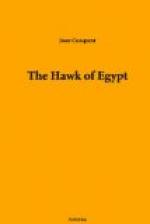And they passed in through the door and stood looking up at the Hawk of Horus painted in the XVIII dynasty upon the wall.
Brilliant in colouring, green and white, with red-tipped wings, it spreads them above the place where once was seen the painted picture of the queen who reigned and suffered and died, thousands of years ago.
“Ah!” said Damaris, as she looked up to the corner. “It is your—your crest--your------”
“It is a fantasy of mine. We trace my father’s house right back without a break to the days of the Pharaohs—so, I believe, does Mohammed Ali, vendor of slippers in the bazaar.” He paused, then added abruptly, with a frown and a movement of the shoulders as though he were trying to shift a burden, “If you will come with me to the inner chamber, if you are not afraid, I will interpret the Story of the Hawk to you in the shadows where it belongs.”
Damaris put out her hand as though to speak, then passed into the inner room, across the threshold of which the dogs of Billi laid themselves down.
“Death is around us,” said Hugh Carden Ali. “Do you believe in omens?—No? Nor I. I wish there was a seat, so that you could rest whilst I tell you------”
Damaris laid her hand gently upon his arm, and he looked down into the face shining dead-white in the reflection of the moon which had silted in through a hole in the roof.
“You know?”
Damaris looked up and smiled.
“Yes! I know. And, being the son of such splendid people, I cannot understand why------”
The gates of pain and love and sacrifice were opened and the girl shrank back against the wall as the tide of pent-up bitterness swept around her in the ruined shrine. The man’s face was white, his eyes blazed in the agony of his hurt, whilst the dogs lifted their heads and growled.
“. . . You do not understand! You do not understand that I love you! And, loving you, I stand a prisoner behind the bars wrought for me by the love of my parents. That I love you as surely you never have been, never will be loved, and that I dare not, can not ask you to be my wife,—even if you loved me—which you do not. . . What? You do not see why I should not marry into my mother’s race even as my father did? I will tell you why.” He gripped her wrists and pulled her to him. “Because I am the outcome of their union. My father is an Arab, my mother an Englishwoman. I—I am a half-caste. I am nearer white, truly, than my father, but—but my son, although he might be white or dark,—a—a native, as you say in England—would only be a half-caste lying on your white breast, if you were my wife.”
The moonbeams lengthened as the man talked on, whilst Damaris learned of one of love’s bitterest mistakes.
“Oh, forgive me!” he ended. “Why did I bring you here to hurt you, to make you cry for a pain which is not yours? Why are you left alone? It is so dangerous in this land of my fathers. Your godmother deserts you whilst she goes to my mother, who is afraid for me—ah! did you not know? The man who loves you has left you to the wind of chance: my friend, Big Ben Kelham—O gods of ancient Egypt, how you must laugh!—my friend! Shall we meet again, I wonder?——”




